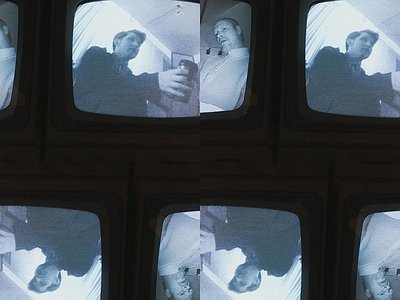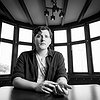Could you describe your creative process on the basis of a piece or album that's particularly dear to you, please? Where did the ideas come from, how were they transformed in your mind, what did you start with and how do you refine these beginnings into the finished work of art?
Hopefully by this point in the interview, it’s clear my obsessions are harmonies and resonance. Throw in syncopated beats and found sounds, and you’ve got me.
On the basis of others’ works, I’ve actually just made a playlist of disparate songs and sounds that I’d like to explore in my own work. I want to dive into the atmosphere and stylising of music I admire and try to absorb what I can.
When writing, sometimes songs pour out, and sometimes they require kneading and resting. I tend to know when a song is essentially done, and then afterwards, I aim to practice the song by myself for a while to an audience of none, so I can naturally polish it over time. But even after the eventual recording is done, I still see possibilities and arrangements for songs that were allegedly finished, which I tend to do in subtle ways live.
There are many descriptions of the ideal state of mind for being creative. What is it like for you? What supports this ideal state of mind and what are distractions? Are there strategies to enter into this state more easily?
I spend a lot of time on public transit, so little riffs or melodic ideas will pop out of nowhere, and I have to hum lightly into my dictaphone so no one thinks I’m the crazy one on the bus. Reading, cooking/baking, walking, and meditating are also good activities for a clear mind.
Because a majority of my music is from a personal perspective, I find conversations with close friends are a goldmine for creativity. I try to retain interesting turns of phrase that people come up whilst trying to explain the difficult-to-explain. I have a super-long word document and an overfull journal of disconnected vocabulary for later recall.
I’m mostly distracted by the ice cream truck, blaring its music right outside my front window. They are usually illegally parked in front of a hydrant.
How is playing live and writing music in the studio connected? What do you achieve and draw from each experience personally? How do you see the relationship between improvisation and composition in this regard?
Playing live can help refine the songs over time. But both live and studio experiences share the prospect of possibility.
I don’t do it enough, but I do love playing live. There’s a spark that comes out of playing for an audience, almost like there’s a moment where you realise that your music is real.
My greatest love, though, is the studio. The improvisational aspect is obvious for a live setting, but if you have the opportunity to experiment in a studio, it’s really exciting, because you can capture something that might come out of you by complete chance; something you can’t really duplicate unless you study the playback.
Compositionally, I’ve always been prepared with songs and arrangements before going into the studio, but I know for my next record, that I want to try and write in the studio, and see where the music takes me.
How do you see the relationship between the 'sound' aspects of music and the 'composition' aspects? How do you work with sound and timbre to meet certain production ideas and in which way can certain sounds already take on compositional qualities?
I truly believe that everything has musicality. Obviously, we have traditional notions of musical instruments, but sound effects and field recordings can really augment a piece when integrated, which is something I’ve recently enjoyed doing. On my song “Crow”, I kept thinking of a ‘bloop’ here, a stretched scream there.
And then of course, that opens discussion to the whole “is this just noise, or is this music?” I don’t really bother with that whole thing, and prefer to think that if one chooses to organise a composition or however they choose to define it, that everything is fair play. Just try not to clutter.
Our sense of hearing shares intriguing connections to other senses. From your experience, what are some of the most inspiring overlaps between different senses - and what do they tell us about the way our senses work? What happens to sound at its outermost borders?
I tend to be a bit taciturn talking about it, because then I become a bit of a party trick, but I have sound to colour synaesthesia, or “chromesthesia” (pretentious word, eh?) I was tested when I was younger when I complained about colour blobs everywhere. My late grandmother thought I had aura perception. I am often stirred by the colours I hear, which is why vocal timbres and chords excite me so much.
Beyond that, nostalgia is a rather neat thing. Sometimes I’ll smell a certain combination of spices, and be transported to an obscure memory in my childhood that I don’t fully recall. Certain sound combinations do that too. There’s a certain rush from hearing the theme tune to a favourite old show, or an old song a loved one used to play. At the borders of it all, I guess you could associate touch and sight as well. Why not? The human experience is rife with processing mystery.
Art can be a purpose in its own right, but it can also directly feed back into everyday life, take on a social and political role and lead to more engagement. Can you describe your approach to art and being an artist?
Well, I try my best to stay politically and socially aware, as insane as it all is, but from my output, I’ve only touched the surface of those themes. And I go back and forth about my general subject matter of personal relationships versus the responsibility and platform that an artist has with broader social issues — after all, Nina Simone insisted reflection of the times from the artist — but I admit, I’m a bit reticent to go too far into that realm, for fear of coming off clumsily, offensively, or short-sighted.
And while I wrote “Dream Ain’t Dead” from political inspirations, it was more about my emotional reaction to American surroundings and a longing for hope, rather than “fuck the establishment!”. I do appreciate music of that direct nature, and it’s incredibly important to do that once in a while, but if one isn’t careful, it can also bog the music down, and turn people away. Hardly the reaction I want when aiming for an inspirational message.
When political themes come out of me, I want them to feel natural, observational: not forced, not condescending, and certainly not with a narrative where I would be speaking for others with a white man messiah complex, but by using my privilege in support of the mental and physical wellbeing of people and friends I see being oppressed. In “Dream Ain’t Dead”, I tried really hard to relay my own experience as a listener, and to relay a message of acknowledgement and kindness. Hopefully the solidarity comes through.
It is remarkable, in a way, that we have arrived in the 21st century with the basic concept of music still intact. Do you have a vision of music, an idea of what music could be beyond its current form?
When Yoko Kanno wrote the score to Macross Plus in the mid-90s, she was in charge of writing pop songs from the future. Her thought process was that since everything comes in cycles, she was going to isolate sounds and trends, and guess whether or not a programmed hologram would sing them. Well, we’ve already got a series of real life Sharon Apples, what with vocaloids and Tupac revivals. So, I suppose the rest of the prediction would mean that everything would start sounding like a Pure Moods disc with bits of Wendy & Lisa and emergency broadcast signals.
One of the positives of our current landscape is how open producers seem to be to amalgamating divergent sounds and styles, though it sometimes comes with the consequence of easily losing identity. But regardless of the actual end-product, humanity has a deep, primal addiction to pulse, and I don’t see that going anywhere.



